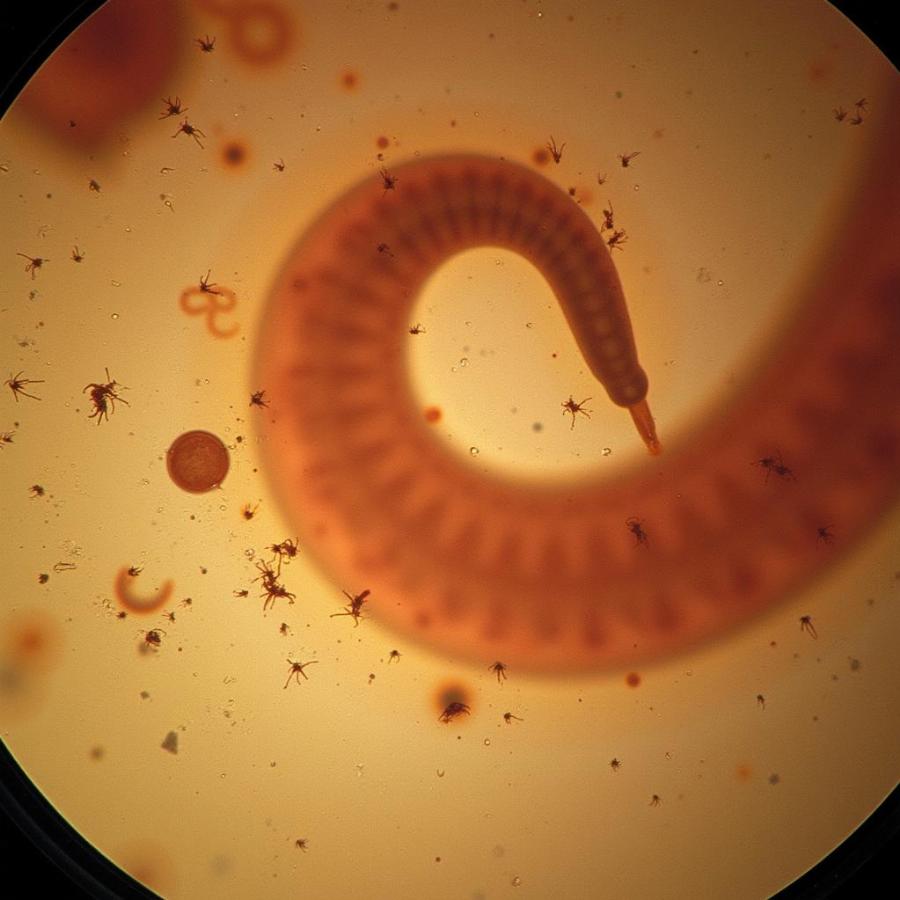Hookworms are nasty parasites that can cause serious health problems for your furry friend. As a responsible dog owner, understanding how to prevent hookworms is crucial for keeping your canine companion happy and healthy. This comprehensive guide will equip you with the knowledge and practical strategies to protect your dog from these pesky parasites.
Understanding Hookworms in Dogs
 Hookworms magnified
Hookworms magnified
Hookworms are tiny, thin worms that live in the intestines of dogs, feeding on their blood. They are barely visible to the naked eye, making them difficult to detect without a veterinarian’s help. Dogs can contract hookworms through various ways:
- Contact with contaminated soil or feces: Hookworm eggs thrive in warm, moist environments like soil and feces.
- Ingestion of larvae: Hookworm larvae can penetrate a dog’s skin, especially if they lie down on contaminated ground.
- Through the mother’s milk: Puppies can inherit hookworms from an infected mother during nursing.
Recognizing the Signs of Hookworms
Early detection is key to effective treatment. Be vigilant and watch out for these common signs of hookworm infestation in your dog:
- Anemia: Hookworms feed on blood, leading to anemia, which can cause weakness, lethargy, and pale gums.
- Diarrhea: Often accompanied by blood, diarrhea is a common symptom of hookworm infection.
- Weight loss: Despite having a normal appetite, infected dogs may lose weight due to malabsorption of nutrients.
- Poor growth: Puppies with hookworms often experience stunted growth and development.
- Skin irritation: If your dog contracted hookworms through skin penetration, you might notice redness, itching, or inflammation.
If you suspect your dog has hookworms, consult your veterinarian immediately. They can perform a fecal examination to confirm the diagnosis and recommend the appropriate treatment.
Effective Hookworm Prevention Strategies
Prevention is always better than cure. Here are some proven methods to protect your dog from hookworms:
1. Regular Deworming
Regular deworming is the cornerstone of hookworm prevention. Your veterinarian can recommend the best deworming schedule and product for your dog based on their age, lifestyle, and risk factors.
2. Fecal Examinations
Schedule routine fecal examinations for your dog, even if they appear healthy. These examinations allow your veterinarian to detect hookworm eggs in the early stages, preventing a full-blown infestation.
3. Maintain a Clean Environment
Keeping your dog’s living area clean is crucial. Regularly remove feces from your yard and dispose of it properly. This simple practice disrupts the hookworm life cycle and reduces the risk of reinfection.
- Pick up poop promptly: Don’t allow feces to accumulate in your yard, especially in areas where your dog spends a lot of time.
- Clean up after walks: Always carry poop bags and dispose of your dog’s waste responsibly while on walks.
4. Practice Good Hygiene
Good hygiene goes a long way in preventing the spread of hookworms. Wash your hands thoroughly with soap and water after handling dog waste or playing in areas where your dog frequents.
- Wash your hands frequently: Make it a habit to wash your hands after every interaction with your dog, especially before meals.
- Clean your dog’s bedding: Regularly wash your dog’s bedding, toys, and any other items they come into contact with using hot water and detergent.
5. Consider Heartworm Medication
Many heartworm preventatives also offer protection against hookworms. Talk to your veterinarian about choosing a broad-spectrum parasite prevention medication that suits your dog’s needs.
The Importance of Veterinary Care
Regular visits to your veterinarian are paramount in preventing and treating hookworms. They can assess your dog’s individual risk factors, recommend the appropriate preventive measures, and address any concerns you might have about your dog’s health.
“Hookworms can be a serious threat to your dog’s health, but with proactive prevention strategies and regular veterinary care, you can effectively protect your furry friend from these parasites.” – Dr. Emily Carter, Veterinarian
Conclusion
Preventing hookworms in dogs is an ongoing responsibility that requires a multi-faceted approach. By implementing the strategies outlined in this guide and maintaining open communication with your veterinarian, you can significantly reduce the risk of hookworm infestation and ensure your dog lives a long, healthy, and parasite-free life.
FAQs
1. Can humans get hookworms from dogs?
Yes, humans can contract hookworms through contact with contaminated soil or feces. Always wear shoes in areas frequented by dogs and wash your hands thoroughly after handling dog waste.
2. How often should I deworm my dog?
The frequency of deworming depends on your dog’s age, lifestyle, and risk factors. Consult your veterinarian to determine the best deworming schedule for your dog.
3. Can hookworms be fatal to dogs?
While hookworm infestations are treatable, they can be fatal to puppies or dogs with weakened immune systems if left untreated.
4. What should I do if I think my dog has hookworms?
If you suspect your dog has hookworms, contact your veterinarian immediately. They can diagnose the infestation and recommend the appropriate treatment plan.
5. How effective are heartworm medications in preventing hookworms?
Many heartworm medications also offer protection against hookworms. However, not all heartworm preventatives are created equal. Talk to your veterinarian about choosing a product that provides broad-spectrum parasite protection.
Do you have other questions about hookworms or other health concerns regarding your furry companion? Check out our other informative articles what are hookworms in dogs, how long does sentinel need to stay down for dogs or hook worm dog.
Need More Help?
Beaut Dogs is your trusted source for all things dog-related. We are committed to providing dog owners with reliable information and resources to help them provide the best possible care for their furry companions. For personalized advice and support regarding hookworm prevention or any other canine health concerns, please don’t hesitate to reach out to us at [email protected]. We’re here to help you keep your furry friend happy, healthy, and parasite-free.